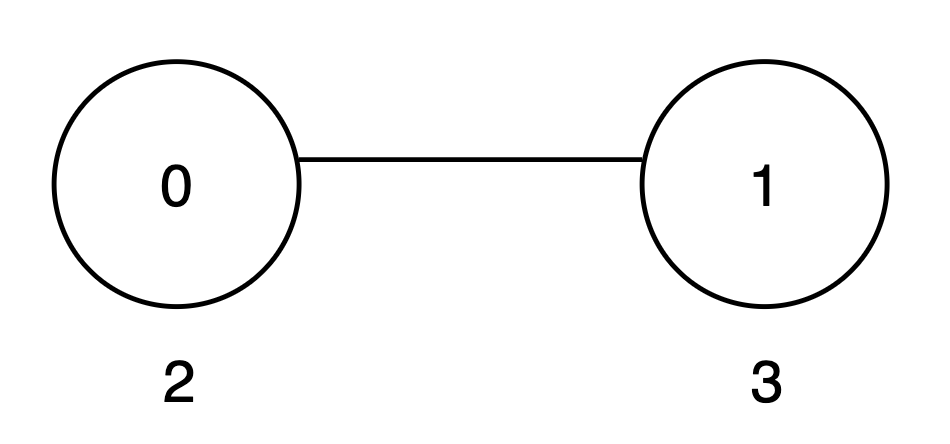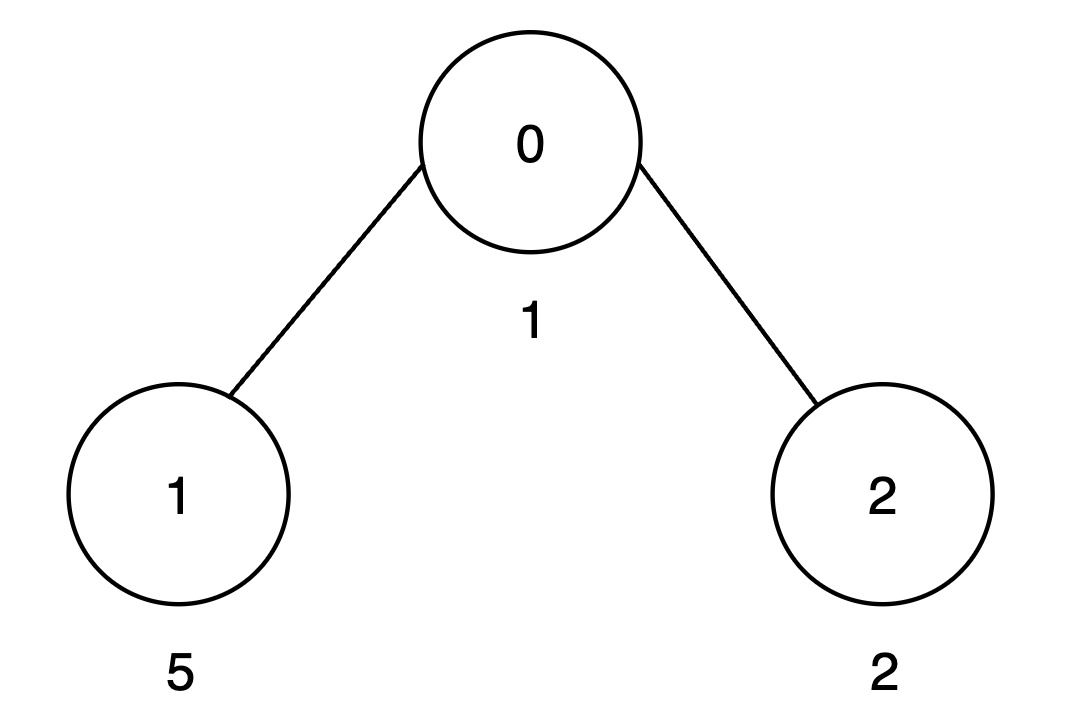LeetCode in Kotlin
3575. Maximum Good Subtree Score
Hard
You are given an undirected tree rooted at node 0 with n nodes numbered from 0 to n - 1. Each node i has an integer value vals[i], and its parent is given by par[i].
A subset of nodes within the subtree of a node is called good if every digit from 0 to 9 appears at most once in the decimal representation of the values of the selected nodes.
The score of a good subset is the sum of the values of its nodes.
Define an array maxScore of length n, where maxScore[u] represents the maximum possible sum of values of a good subset of nodes that belong to the subtree rooted at node u, including u itself and all its descendants.
Return the sum of all values in maxScore.
Since the answer may be large, return it modulo 109 + 7.
Example 1:
Input: vals = [2,3], par = [-1,0]
Output: 8
Explanation:

- The subtree rooted at node 0 includes nodes
{0, 1}. The subset{2, 3}is good as the digits 2 and 3 appear only once. The score of this subset is2 + 3 = 5. - The subtree rooted at node 1 includes only node
{1}. The subset{3}is good. The score of this subset is 3. - The
maxScorearray is[5, 3], and the sum of all values inmaxScoreis5 + 3 = 8. Thus, the answer is 8.
Example 2:
Input: vals = [1,5,2], par = [-1,0,0]
Output: 15
Explanation:

- The subtree rooted at node 0 includes nodes
{0, 1, 2}. The subset{1, 5, 2}is good as the digits 1, 5 and 2 appear only once. The score of this subset is1 + 5 + 2 = 8. - The subtree rooted at node 1 includes only node
{1}. The subset{5}is good. The score of this subset is 5. - The subtree rooted at node 2 includes only node
{2}. The subset{2}is good. The score of this subset is 2. - The
maxScorearray is[8, 5, 2], and the sum of all values inmaxScoreis8 + 5 + 2 = 15. Thus, the answer is 15.
Example 3:
Input: vals = [34,1,2], par = [-1,0,1]
Output: 42
Explanation:

- The subtree rooted at node 0 includes nodes
{0, 1, 2}. The subset{34, 1, 2}is good as the digits 3, 4, 1 and 2 appear only once. The score of this subset is34 + 1 + 2 = 37. - The subtree rooted at node 1 includes node
{1, 2}. The subset{1, 2}is good as the digits 1 and 2 appear only once. The score of this subset is1 + 2 = 3. - The subtree rooted at node 2 includes only node
{2}. The subset{2}is good. The score of this subset is 2. - The
maxScorearray is[37, 3, 2], and the sum of all values inmaxScoreis37 + 3 + 2 = 42. Thus, the answer is 42.
Example 4:
Input: vals = [3,22,5], par = [-1,0,1]
Output: 18
Explanation:
- The subtree rooted at node 0 includes nodes
{0, 1, 2}. The subset{3, 22, 5}is not good, as digit 2 appears twice. Therefore, the subset{3, 5}is valid. The score of this subset is3 + 5 = 8. - The subtree rooted at node 1 includes nodes
{1, 2}. The subset{22, 5}is not good, as digit 2 appears twice. Therefore, the subset{5}is valid. The score of this subset is 5. - The subtree rooted at node 2 includes
{2}. The subset{5}is good. The score of this subset is 5. - The
maxScorearray is[8, 5, 5], and the sum of all values inmaxScoreis8 + 5 + 5 = 18. Thus, the answer is 18.
Constraints:
1 <= n == vals.length <= 5001 <= vals[i] <= 109par.length == npar[0] == -10 <= par[i] < nforiin[1, n - 1]- The input is generated such that the parent array
parrepresents a valid tree.
Solution
import kotlin.math.max
class Solution {
private val digits = 10
private val full = 1 shl digits
private val neg = Long.Companion.MIN_VALUE / 4
private val mod = 1e9.toLong() + 7
private lateinit var tree: Array<ArrayList<Int>>
private lateinit var `val`: IntArray
private lateinit var mask: IntArray
private lateinit var isOk: BooleanArray
private var res: Long = 0
fun goodSubtreeSum(vals: IntArray, par: IntArray): Int {
val n = vals.size
`val` = vals
mask = IntArray(n)
isOk = BooleanArray(n)
for (i in 0..<n) {
var m = 0
var v = vals[i]
var valid = true
while (v > 0) {
val d = v % 10
if (((m shr d) and 1) == 1) {
valid = false
break
}
m = m or (1 shl d)
v /= 10
}
mask[i] = m
isOk[i] = valid
}
tree = Array(n) { initialCapacity: Int -> ArrayList(initialCapacity) }
val root = 0
for (i in 1..<n) {
tree[par[i]].add(i)
}
dfs(root)
return (res % mod).toInt()
}
private fun dfs(u: Int): LongArray {
var dp = LongArray(full)
dp.fill(neg)
dp[0] = 0
if (isOk[u]) {
dp[mask[u]] = `val`[u].toLong()
}
for (v in tree[u]) {
val child = dfs(v)
val newDp = dp.copyOf(full)
for (m1 in 0..<full) {
if (dp[m1] < 0) {
continue
}
val remain = full - 1 - m1
var m2 = remain
while (m2 > 0) {
if (child[m2] < 0) {
m2 = (m2 - 1) and remain
continue
}
val newM = m1 or m2
newDp[newM] = max(newDp[newM], dp[m1] + child[m2])
m2 = (m2 - 1) and remain
}
}
dp = newDp
}
var best: Long = 0
for (v in dp) {
best = max(best, v)
}
res = (res + best) % mod
return dp
}
}

